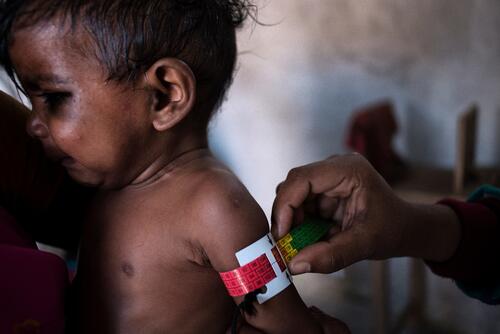India, 1 March 2014 -The State Health Society, Bihar, today inaugurated a Malnutrition Intensive Care Unit (MICU) for treating the most complicated cases of severe acute malnutrition in children at the Darbhanga Medical College Hospital (DMCH) in Bihar, India. The MICU will be operated jointly by Médecins Sans Frontières (MSF) and the Ministry of Health staff from the Darbhanga Medical College.
Treating complicated cases of malnutrition
The MICU aims to increase access to treatment for the most severely malnourished children with medical complications in the district. “The opening of the MICU is a positive step toward treating the complicated cases of malnutrition in Bihar and demonstrating that severe acute malnutrition is a medical condition that requires specific attention and management within the public healthcare system.” says Geoffroy Duqué, MSF’s country director in India.
Children with severe acute malnutrition can be treated at the community level but cases that involve medical complications require inpatient care. The MICU will be the Unit where such complicated cases of severe acute malnutrition in children are treated. Inaugurated by the Principal of the DMCH, Dr SN Sinha, the MICU is the first of its kind in India and will provide specialised inpatient medical and nutritional care for children who are severely ill and at highest risk of mortality.
Medical staff training
Working in close collaboration with the DMCH, MSF will train medical staff till 2015 in order to ensure capacity building and continuity of work in the Unit.
“It is an honour that DMCH will be the first institution in the country to provide tertiary care to malnourished children. We are therefore committed to the sustainability of the MICU, and hope it will set standards in handling malnutrition in Bihar. I am convinced this will contribute to make Darbhanga a malnutrition-free district,”said Dr S.N. Sinha.
This is a step closer to addressing severe acute malnutrition in Bihar, where it is estimated that 8.6%1 of children under the age of five years are severely malnourished.With a conservative prevalence of 3.5%, this means that more than 27,000 children are affected by severe acute malnutrition in Darbhanga district only.
1. According to the NFHS III – 2005/2006 (most recent data available)
MSF has been working in India since 1999. Apart from malnutrition, MSF also works with the State Health Society of Bihar to treat kalaazar, a neglected disease that is endemic in Bihar. In India, MSF also runs projects in Andhra Pradesh, Chattisgarh, Jammu & Kashmir, Maharashtra, Manipur and Nagaland.
MSF's malnutrition activities in India
MSF has been addressing malnutrition worldwide since its creation more than 40 years ago. In India, MSF has also been treating children with severe acute malnutrition in Bihar, where large numbers of children in the community are affected due to seasonal malnutrition. MSF has focused on severe acute malnutrition as it is the most dangerous form of malnutrition and needs immediate medical attention – which is often not accessible in Bihar.
Severely malnourished individuals, particularly young children, lose their muscle mass – this is why they appear so thin. Severe acute malnutrition weakens the immune system and reduces the ability to fight off infection. Severely malnourished children therefore have a much higher chance of dying from common childhood illnesses such as respiratory infections or diarrhoea.
In Biraul block of Darbhanga district in Bihar, MSF has been using a community approach, widely known as CMAM (Community Management of Acute Malnutrition), to treat the majority of severely malnourished children at the level of Primary Health Centres. To date, approximately 13,000 children with severe acute malnutrition have been treated. This approach brings care and treatment closer to patients and their families, increases coverage, and reduces the risk of treatment interruptions from the programme.
MSF is committed to working with the Indian government, the medical community and civil society on the issue of treating severe acute malnutrition. The first step towards this is the recognition that children in India with severe acute malnutrition are in critical need of medical attention.




